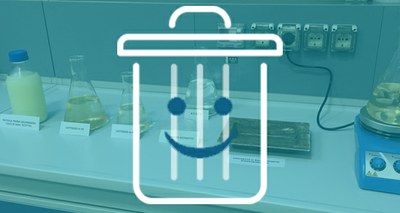Environment: 100% biodegradable packaging from dairy industry waste
22/2/2018
 The project BIOCOSI’, developed at ENEA jointly with the Italian start-up EggPlant, aims at putting a stop to energy, food and materials waste by using waste water from the cheese industry to manufacture biogradable and compostable food packaging, such as cheese containers or milk bottles. The project BIOCOSI’ (innovative processes and technologies for BIOdegradable and COmpostable packaging for an economic,/circular, Sustainable and Intelligent industry), in 18 months will turn cheese waste into a resource, redefining sustainable packaging and introducing biodegradable materials in the production lines. The project has a double innovative value: on the one hand, the membrane separation process developed by ENEA at the Brindisi research center (in south Italy) for milk fractionation, which allows both separate collection of all the components – such as serum proteins/peptides, lactose and mineral salts– and of ultrapure water; on the other, the collaboration EggPlant-ENEA for the production of biodegradable bioplastic bioderived from lactose extracted from waste, which allows a waste valorization oriented towards the innovation of the agri-food chain, entailing benefits also in terms of a reduction of pollutants from the cheese industry and of the impact of plastic on the environment. According to a study conducted by ENEA and presented last december, 83% of the waste collected in the Italian seas was disposable plastic packaging.
The project BIOCOSI’, developed at ENEA jointly with the Italian start-up EggPlant, aims at putting a stop to energy, food and materials waste by using waste water from the cheese industry to manufacture biogradable and compostable food packaging, such as cheese containers or milk bottles. The project BIOCOSI’ (innovative processes and technologies for BIOdegradable and COmpostable packaging for an economic,/circular, Sustainable and Intelligent industry), in 18 months will turn cheese waste into a resource, redefining sustainable packaging and introducing biodegradable materials in the production lines. The project has a double innovative value: on the one hand, the membrane separation process developed by ENEA at the Brindisi research center (in south Italy) for milk fractionation, which allows both separate collection of all the components – such as serum proteins/peptides, lactose and mineral salts– and of ultrapure water; on the other, the collaboration EggPlant-ENEA for the production of biodegradable bioplastic bioderived from lactose extracted from waste, which allows a waste valorization oriented towards the innovation of the agri-food chain, entailing benefits also in terms of a reduction of pollutants from the cheese industry and of the impact of plastic on the environment. According to a study conducted by ENEA and presented last december, 83% of the waste collected in the Italian seas was disposable plastic packaging.
In addition to managing the extraction process of lactose and active peptides to be used as supplements in the new products, and providing technical and scientific support for the development of bioplastic (PHA- polyhydroxyalkanoates) by fermentation process, ENEA is also involved with the subsequent characterization of the biopolymer.
“This innovation, embracing the principles of a circular economy, with the objective “ zero waste by end of process” - Valerio Miceli, at the ENEA Biotechnologies and Agroindustry Division, pointed out, meets not only ethical and environmental needs, but also economic ones, related to the high costs of cheese waste disposal, enabling a 23% cut of the unitary cost of production of the biopolymer”.
An actual paradigm shift which revolutionizes the conventional concept of waste, turning it into a green resource capable of meeting the demand for technological innovation for food safety and new added high-value materials for sustainable agriculture and industry, with the objective of favoring a virtuous circle of nutrients among rural and urban areas, promoting energy saving, recycling and low-carbon emission production.
“This proposal may represent an integrative source of wealth in terms of profitability for the cheese industries themselves, for the stakeholders operating in the supply chain and for the innovative SMEs aiming at becoming more competitive on the territory by diversifying their product range” Miceli went on.
“Currently, bioplastics account for approximately 1% of the plastic manufactured every year in Europe (about 300 million tonnes). But the demand is on the rise and with more sophisticated materials and emerging products and applications, the market is continuosly growing. According to the latest market data compiled by European bioplastics, the association of the bioplastic industry in Europe, global bioplastic manufacturing capacity is set to increase by 50% in the medium term, from around 4.2 million tons in 2016 to 6.1 million tons in 2021. Double-digit increases also for the Italian industry of bioplastics which in 2015, according to a study commissioned by Assoplastiche to Plastic Consult, registered a 25% increase in manufacturing and a 475 million euro turnover (+10%).
Developed within the call for proposals of the Regione Puglia INNONETWORK and funded with 1.4 million euro by the Regional Operative Programme POR-FESR 2014-2020, the project BIOCOSÌ includes among its partners the University of Bari and the companies CSQA, RL Engineering, Caseificio Colli Pugliesi, Compost Natura and the Network of Public Research Laboratories MICROTRONIC, coordinated by the Institute of Photonics and Nanotechnologies of the CNR.
The initiative is part of a wider program of ENEA’ s activities aimed at the eco-innovation of the process, product and system, at the industrial ecology of the whole value chain, with tools and integrated approaches for the efficient use and management of resources and cycles closure on the territory and in productive systems, as well as innovative solutions of collaborations, and new business and consumption models such as open source, pay per use, industrial symbiosis.
For more information please contact:
Valerio Miceli, ENEA – Biotechnologies and Agroindustry valerio.miceli@enea.it
